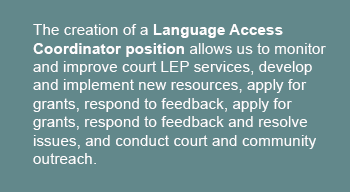In a related question, the survey asked jurisdictions to highlight the most notable initiative or improvement in their language access program. While the previous question (Q 41) asked for an overview of their programs and services, question 42 was much more narrow, asking for specific initiatives or improvements that were accomplished.
Q42 What has been the most notable initiative or improvement in your language access program that you wish to highlight?
Nearly all of the participating jurisdictions (46 out of 48) responded affirmatively that there were specific and concrete improvements. (Only 2 jurisdictions answered N/A.) Some highlighted individual improvements, while others detailed various areas of extensive improvements throughout their systems. Some of the most commonly notable improvements included hiring of a full time language access coordinator, increasing training, creating training programs, establishing interpreter certification and recruitment, implementing court rules and policies, creating of LAPs, and translating documents and forms.
For example, the following jurisdictions detailed significant programmatic improvements:
- Prior to this, we had no formalized system of language access provision. Today, we have guidelines, registered interpreters, court rules, an oversight board for the profession and a better awareness by the Bench of the need. We have a formal grievance process and staff finds it easy to coordinate with their trained language access coordinator who is present in every court in the state.
- Extending services beyond the courtroom; boosting the translation program; developing language portals with robust web content (introductory videos, layers of core content in the target language and bilingual forms).
- One of our biggest improvements has been to establish relationships with community, legal, faith-based, and other state agencies resulting in greater knowledge of issues and need to improve interpreter services.
- The development of local language access plans and appointment of language access coordinators for each court focused our courts on the need to provide quality language access services. On a statewide level, the recent adoption by our Supreme Court of our LAP for the Unified Judicial System will allows us to attack these issues in a more strategic fashion.
One of the most frequently cited improvements highlighted was the hiring of a full-time language access coordinator, which had a broad impact on all aspects of a jurisdiction’s programs. A full-time and often statewide coordinator not only supervises and monitors a program, they can fill a number of roles such as obtaining grant funding, coordinating trainings, engaging in community outreach, and handling interpreter scheduling.
Full Time Language Access Coordinator/Manager
- Hiring a full time language access coordinator has given the AOIC the necessary capacity to establish an interpreter certification program, coordinate judicial and court staff trainings, collect data, and develop relationships with local partners and court staff to implement meaningful language access.
- The hiring of a full-time interpreter services coordinator has provided quality interpreting, reduced delays in scheduling hearings and trials where an interpreter is needed, and increased efficiency in costs and service. The training and qualification of an on-staff Yup'ik interpreter in Bethel has enabled the court system to respond immediately to the need for a Yup'ik interpreter. The use of video remote interpreting services has increased our ability to use qualified and certified interpreters.
- The State of Nebraska hired its first Statewide Language Access Coordinator in Fall 2015. In Spring 2016, we wholly revised our 2-day Interpreter Orientation workshop, making it far more interactive and giving prospective interpreters significant hands-on experience. Each participant is provided a thumb drive with Orientation materials, test prep resources, and the beginnings of their interpreter library. We also removed the written interpreter exam as a component of Interpreter Orientation, scheduling it one month after the workshop. With these
 changes, our Written Exam passage rate is now 25%.
changes, our Written Exam passage rate is now 25%.
Training
- In the past 5 years, and thanks in part to the technical assistance grant from SJI, the Louisiana Supreme Court has developed and implemented a court interpreter training and testing program, provided training to judges and court staff, and adopted policies including the interpreter code of ethics in the Louisiana Rules of Court. The result of this program is a continually increasing pool of qualified and credentialed court interpreters for use by the courts, attorneys, and others.
- The development of the web-based training on LEP issues allows for all Judicial Branch staff to receive the training within a specified time frame and for the development of a refresher course. The implementation of the video with the translation into Spanish of the Advisement of the Rights for Family Support Magistrate court. This video is played at the beginning of all Family Support sessions.
- Language Access Specialists: over 100 bilingual employees were trained and certified to provide language access services outside the courtroom in Spanish, Navajo, Mandarin, Polish and Keres. Employees comply with annual CEUs, for which we offer webinars and an annual symposium. Employees who successfully complete the program and maintain their CEUs qualify for a pay differential. Developed a training and certification program for Navajo and Pueblo Languages. Online and in-person training offered to judges, staff and interpreters. Translation of the NM judiciary's website. Collaborative efforts with other states. Developed training for interpreters to work with LEP jurors, which will be implemented this fall.
- Our education of judicial partners regarding the legal obligations to provide language support and how to fulfill these obligations.
Interpreters (Recruitment, certification, credentialing)
- We have increased the number of registered and certified interpreters.
- We are gaining more interest from people who would like to serve as interpreters.
- Credentialing of interpreters
- Development of detailed supreme court rules establishing a statewide interpreter credentialing program. Creation of a statewide registry of certified and registered interpreters.
- Although very simple, the Judiciary of Guam is the only entity on Guam that has an LAP and "court registered" interpreters. Our list is constantly requested by different government agencies, private attorneys, and non-profit organizations who need interpreters.
- Certification program.
- Credentialing of interpreters.
Court Rules
- We have made great strides since the Summit, including the issuance of new supreme court rules relating to language access.
- Strong infrastructure of court rules for the appointment of language services and language access.
- Adoption of increased standards through successive rule amendments has strengthened interpreting standards in court and court-related proceedings, reduced communication and language barriers to facilitate participation in such proceedings, and increased the pool of registered and officially designated court interpreters; utilization of remote interpreting technology has further enhanced interpreter services delivery to fulfill the needs of limited English proficient persons and ensure quality of services.
Increased Oversight (LAP/Committee)
- Every county within our state now has an LAP in place.
- The establishment of the DC Courts Language Access Advisory Committee.
Translation
- We have instituted a process for translation of court forms which includes requesting and prioritizing translations, and a reoccurring budget line for translation of court forms.
- A current project to translate 300 documents into seven languages.
- We have embarked on the translation of 300 documents not only into Amharic, the second most-frequently encountered spoken language, but also into 6 other languages. We are exploring the addition of VRI and simultaneous RI. We continue to offer legal term training to bilingual staff.
I Speak Cards
- "I Speak Cards" for those with LEP. Adoption of a Language Services Plan. Contracting with a single source vendor to provide interpreting services in all NH courts.
- We provided I Speak cards to the courts and law enforcement agencies which has been very effective.
Policies and Mandates
- Promulgation of updated language access plan policies as Administrative Directive #01-17
- Revision of our LAP to be more aligned with recent DOJ enforcement interpretations of Title VI.
Miscellaneous
- Development and implementation of a statewide interpreter scheduling system.
- Restructuring of our department to better meet the needs of the court.
- Provision of services beyond the courtroom & court proceedings; hiring of full time Spanish interpreters; program to inventory and translate all court forms
- The appropriation from the Legislature which provided for a full time, statewide Language Access Manager, as well as video remote interpreting equipment for the entire state, and funding for some direct services.
- Leadership support, LASC, and development and adoption of our Standards and implementation of Language Access Coordinators.
- NY's REMOTE INTERPRETING PROGRAM, from OLA and intra-court use, has greatly increased the provision of qualified interpreters to more courts, in a timely and efficient manner. BILINGUAL ORDERS in multiple languages, in civil and criminal court types, have also changed the process and LEP's understanding of the process.
- Evidence Code section 756, progress by the courts in civil expansion and the unveiling of our online Language Access Toolkit.
- More efficient data collection/analysis platform, recruiting, AOC-sponsored continuing education for interpreters, increased number of SPA and LOTS interpreters in registry.
- Expanded access to services at no cost to the individual requiring the assistance of an interpreter.








